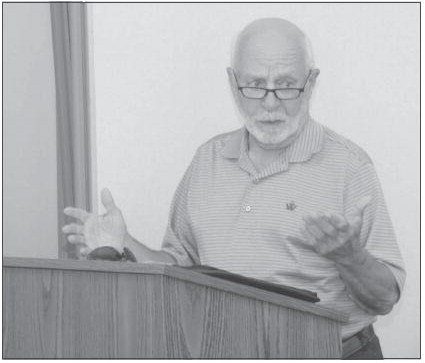continued from page farms,” he ….


continued from page
farms,” he summarized.
According to Filippone, these solar panels are categorized three ways – as rooftop panels, which was the initial introduction of solar panels into Georgia and which don’t impact overall state welfare because of a direct relationship between homeowners and the solar companies; and two larger operations which work through purchase or lease of a property by a property owner. “Right now, 10,000 acres of land in Georgia are solar farms,” Fillippone explained. “Montgomery County has a little over 2,000 acres.”
He stated that he believes that this growing trend of solar farms – which has caused Georgia to be ranked 7th in the nation for its solar industry, produced 5.936 megawatts of the state’s total energy, invested $6.5 billion into the Georgia economy, and created around 5,000 temporary jobs – are going to cause farmers to feel pressured to sell their farms.
“Farmers are under pressure from big corporate farms competing with them and are under pressure from government overregulation; they’re also under pressure from families growing younger members of the family who don’t want to be in farming anymore. These farmers are getting old and they want to do something that will cover the rest of their lives,” Fillippone told the Commissioners. “It is really hard for these people to say no [to large amounts of money by solar companies], so the concerns of the state are pretty huge about what to do with this thing. They have to take into consideration the farmers that own these properties.”
Filippone shared that the Montgomery County Development Authority had made the decision not to enter into any lease agreements with solar companies, which is one way of limiting their entrance into the county. “In Montgomery County, everything that we have is purchased. The Development Authority has no property that is leased. The Development Authority has voted on this – we will not consider entering into any agreement where there is a lease involved,” he said. “The reason for that is the Development Authority has to have ownership of the property because we are a pseudogovernment. Primarily, the way it works is that we take title to the company and all of the company assets for a specific period of time – in this particular case, that’s a 25-year contract. Since it’s in our name, they can get tax assistance, but we are not benevolent enough that we want to give them this stuff for free.” According to Filippone, instead of utilizing leasing, the agency uses a system to discount the tax costs of a project to help convince projects to come to the county, but also ensures that the county receives revenue through discounting personal property taxes, and allowing land taxes (at a value of $4,500 an acre) and power grid taxes to be paid over 25 years. For the solar projects in Montgomery County, the county could begin seeing revenue from the projects as early as late 2024, and at the latest, 2025. “We did not buy the property for the solar farm from Charlie Robison – the solar company did that through a bond. We merely helped put this in place to help get the revenue source,” he explained.
A total of $500,000 is expected annually from these solar farms; the money will be halved between the Montgomery County Board of Education and Board of Commissioners. “It’s the best of both worlds – it didn’t cost the county one dime and is a big plus for us,” Fillippone added.
Yet, as this project nears completion, Filippone told the Commission that he feels that all government agencies needed to make a decision on letting future solar projects into the county. “We would like to be on the same page – we being the County Commission and the Development Authority. I have gotten a number of phone calls over the last few months from several people that are asking me a variety of questions about leasing property. We have made a decision that we are not going to even consider looking at or doing any kind of solar panels through a lease. It doesn’t make sense from a tax perspective because we don’t own the property anyway and can’t give them tax credits. Secondly, what do you do with the property when it’s over?” he emphasized.
Filippone added, “We will continue to look at whatever comes into us from a purchase perspective, but I think it would be wise if we all sat down and discussed where the county wanted to go with this thing.”
One of the solutions which Filippone shared could be explored is countywide zoning, to which rural residents are normally vehemently opposed. Filippone said he understood this disapproval of zoning, but also understood the benefits it could have in controlling what projects entered the county. “The problem is it can’t work for you and not continued from page
your neighbor,” he summarized.
“Whatever your decisions are in this, the Development Authority will follow your lead. I don’t envision we will get any more solar farms with big pieces of property. I don’t see any, and we don’t go out and solicit this business; they come to us. But, if we get another one, we will look into it,” Filippone concluded.








